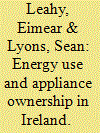| Srl | Item |
| 1 |
ID:
097274


|
|
|
|
|
| Publication |
2010.
|
| Summary/Abstract |
This paper examines household energy use and appliance ownership in Ireland. Logit regression analyses on a large micro-dataset reveal how household characteristics can help explain the ownership of energy using appliances. Using OLS regression models, we explore the factors affecting residential energy demand conditional on appliance ownership. Results suggest that the methods of space and water heating employed by a household are even more important than electrical appliances in explaining domestic energy usage. However, the stock of appliances must be included in such models so that results will not be biased. The methods employed in this paper can be easily adopted for studies of household energy use in other countries where household expenditure survey data are available.
|
|
|
|
|
|
|
|
|
|
|
|
|
|
|
|
| 2 |
ID:
166968


|
|
|
|
|
| Summary/Abstract |
This study explores the effect of slum rehabilitation on appliance ownership and its implications on residential electricity demand. The low-income scenario makes it unique because the entire proposition is based on the importance of non-income drivers of appliance ownership that includes effects of changing the built environment (BE), household practices (HP) and appliances characteristics (AC). This study demonstrates quantitatively that non-income factors around energy practices influence appliance ownership, and therefore electricity consumption. The methodology consists of questionnaire design across the dimension of BE, HP and AC based on social practice theory, surveying of 1224 households and empirical analysis using covariance-based structural equation modelling. Results show that higher appliance ownership in the slum rehabilitation housing is due to change in household practice, built environment and affordability criteria of the appliances. Change in HP shifts necessary activities like cooking, washing and cleaning from outdoor to indoor spaces that positively and significantly influences higher appliance ownership. Poor BE conditions about indoor air quality, thermal comfort and hygiene; and product cost, discounts and ease of use of the appliances also triggers higher appliance ownership. The findings of this study can aid in designing better regulatory and energy efficiency policies for low-income settlements.
|
|
|
|
|
|
|
|
|
|
|
|
|
|
|
|